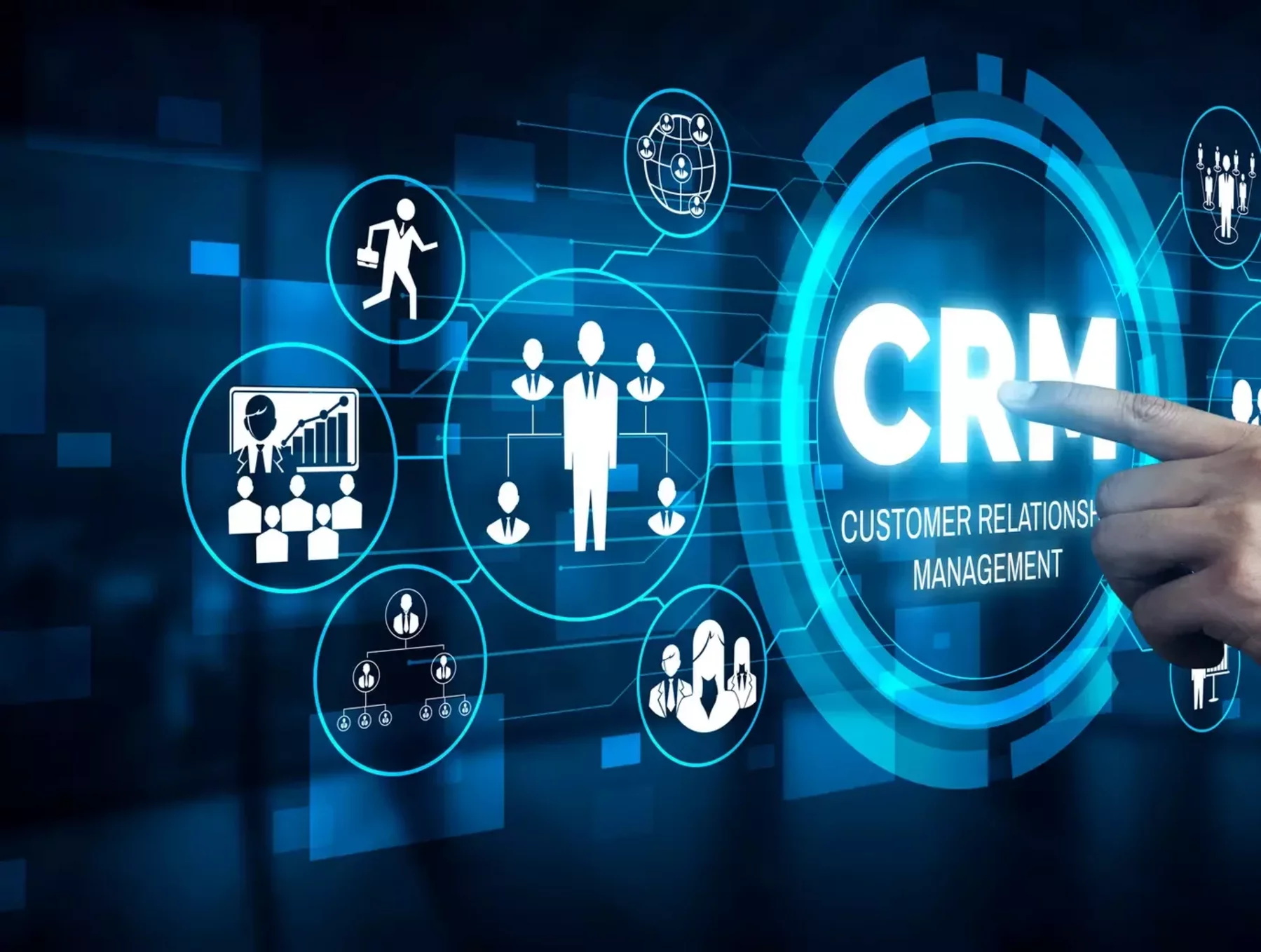CRM Software: Types Benefits and Latest Trends
Introduction CRM software
CRM (Customer Relationship Management) software is a type of software that helps businesses manage their interactions with customers, clients, and prospects. It typically includes a range of tools for organizing and tracking customer data, automating sales and marketing processes, and providing insights into customer behavior.
CRM software can be used by businesses of all sizes, from small startups to large enterprises, and it can be customized to fit the unique needs of each business.
Contact management:
This allows businesses to keep track of customer and prospect contact information, including names, addresses, phone numbers, and email addresses.
Sales automation:
This includes tools for managing sales pipelines, tracking deals, and automating sales processes such as lead generation and follow-up.
Marketing automation:
This includes tools for creating and managing email campaigns, social media campaigns, and other marketing activities.
Analytics and reporting:
This provides businesses with insights into customer behavior and helps them make data-driven decisions.
Overall, CRM software can help businesses improve customer relationships, streamline sales and marketing processes, and ultimately increase revenue.
Types of CRM software
There are several types of CRM software available, each designed to meet different business needs. Here are the most common types:
Operational CRM:
This type of CRM is focused on managing customer-facing processes, such as sales, marketing, and customer support. It typically includes features such as contact management, lead tracking, and customer service management.
Analytical CRM:
This type of CRM is focused on analyzing customer data to improve business performance. It includes features such as customer segmentation, data mining, and predictive modeling to identify trends and patterns in customer behavior.
Collaborative CRM:
This type of CRM is focused on facilitating communication and collaboration between different departments within a business, such as sales, marketing, and customer support. It includes features such as shared calendars, task management, and team messaging.
Strategic CRM:
This type of CRM is focused on long-term customer relationships and retention. It includes features such as loyalty programs, customer surveys, and customer feedback management to help businesses build strong relationships with their customers.
Social CRM:
This type of CRM is focused on managing customer interactions on social media platforms. It includes features such as social media monitoring, sentiment analysis, and social media engagement tools to help businesses better engage with their customers on social media.
Each type of CRM software has its strengths and weaknesses, so businesses should carefully consider their needs and choose the type of CRM that best fits their requirements.
Benefits of CRM software
CRM (Customer Relationship Management) software can provide a range of benefits to businesses of all sizes.
Improved customer relationships:
By providing a centralized database of customer information and tracking all interactions with customers, CRM software can help businesses build stronger relationships with their customers.
Increased efficiency:
By automating repetitive tasks and streamlining processes, CRM software can help businesses save time and increase productivity. This can allow employees to focus on more valuable tasks, such as building relationships with customers and closing deals.
Enhanced collaboration:
By providing a centralized platform for managing customer data and communication, CRM software can help different departments within a business work together more effectively. This can lead to better alignment between sales, marketing, and customer support teams.
Data-driven decision-making:
By providing insights into customer behavior and trends, CRM software can help businesses make data-driven decisions. This can help businesses identify growth opportunities, improve marketing campaigns, and optimize sales processes.
Improved customer service:
By providing a centralized platform for managing customer service requests and tracking customer interactions, CRM software solutions can help businesses provide more efficient and effective customer service. This can lead to higher customer satisfaction and better online reviews.
Overall, CRM software can help businesses improve their bottom line by increasing sales, improving customer loyalty, and streamlining business processes.
Choosing the right CRM software
Choosing the right CRM (Customer Relationship Management) software for your business can be a daunting task, but here are some key factors to consider:
Business needs:
Identify your business needs and what you hope to achieve with CRM software. This will help you narrow down the options and choose a solution that aligns with your goals.
Budget:
Consider your budget and the cost of the CRM software. There are various CRM software options available, ranging from free to high-end enterprise-level solutions. Choose a solution that is affordable and provides a good return on investment.
Ease of use:
Look for CRM software that is easy to use and has a user-friendly interface. A solution that is complicated to use may not be adopted by employees, which can undermine its effectiveness.
Features:
Consider the features of the CRM software and make sure they align with your business needs. Look for features that will help you manage your customer interactions, automate your sales and marketing processes, and provide valuable insights into your customer base.
Integration:
Look for CRM software that can integrate with your existing software systems, such as your email marketing software, accounting software, or e-commerce platform. This will help you streamline your operations and avoid data silos.
Support:
Choose a CRM software that provides good customer support, including online documentation, phone support, and email support. Make sure the vendor has a good reputation for customer service and support.
By considering these factors, you can choose a CRM software that fits your business needs and provides the tools you need to improve customer relationships, streamline operations, and grow your business.
CRM software trends and innovations
The world of CRM (Customer Relationship Management) software is constantly evolving, with new trends and innovations emerging all the time. Here are some of the latest trends and innovations in CRM software:
Artificial intelligence (AI) and machine learning:
AI and machine learning are being integrated into CRM software to automate tasks, such as lead scoring and customer segmentation. This can help businesses improve efficiency and provide more personalized customer experiences.
Cloud-based CRM:
Cloud-based CRM software is becoming increasingly popular, as it allows businesses to access their data from anywhere and at any time. This can be especially useful for businesses with remote teams or multiple locations.
Social CRM:
Social CRM is a type of CRM software that focuses on managing customer interactions on social media platforms. With social media being an important channel for customer communication, businesses are using social CRM to engage with customers on social media and build stronger relationships.
Mobile CRM:
Mobile CRM software is designed for use on mobile devices, such as smartphones and tablets. With more people using mobile devices to access the internet, mobile CRM can help businesses stay connected with their customers on the go.
Predictive analytics:
Predictive analytics is a type of data analysis that uses machine learning algorithms to predict future outcomes based on historical data. In CRM software, predictive analytics can be used to identify potential sales opportunities, improve lead conversion rates, and provide more targeted marketing campaigns.
Personalization:
Personalization is becoming increasingly important in CRM software, as businesses look for ways to provide more personalized customer experiences. CRM software is being used to collect and analyze customer data, such as browsing behavior and purchase history, to create more personalized interactions with customers.
By keeping up with these trends and innovations, businesses can stay ahead of the curve and use CRM software to improve customer relationships and grow their businesses.
Conclusion
In conclusion, CRM (Customer Relationship Management) software can provide a range of benefits to businesses of all sizes. It can help businesses improve customer relationships, increase efficiency, enhance collaboration, make data-driven decisions, and improve customer service. When choosing CRM software, businesses should consider their needs, budget, ease of use, features, integration, and support. The world of CRM software is constantly evolving, with new trends and innovations emerging all the time, such as artificial intelligence, cloud-based CRM, social CRM, mobile CRM, predictive analytics, and personalization. By keeping up with these trends and innovations, businesses can use CRM software to stay ahead of the curve and provide better customer experiences.
What is CRM?
CRM stands for Customer Relationship Management. It is a business strategy that aims to manage interactions with customers and potential customers in a way that builds strong and long-lasting relationships with them. This can involve collecting and analyzing customer data, automating marketing and sales processes, and providing personalized customer experiences. The ultimate goal of CRM is to improve customer satisfaction, increase customer loyalty, and drive business growth.
what is the CRM full form?
CRM stands for Customer Relationship Management.
What is CRM Software?
It allows companies to organize customer data, track customer interactions and preferences, automate sales and marketing processes, and provide personalized customer experiences. CRM software can be used by sales, marketing, and customer service teams to improve customer engagement, build stronger customer relationships, and drive business growth.
What are the Common Features of CRM Software?
Some common features of CRM software include:
- Contact management: managing customer information and communication history
- Sales automation: tracking sales activities and deals
- Marketing automation: automating marketing campaigns and lead generation
- Customer service and support: managing customer inquiries and support requests
- Analytics and reporting: generating insights from customer data
- Collaboration tools: facilitating communication and collaboration among teams.
What is an example of CRM software?
There are many examples of CRM software available, including Salesforce, HubSpot, Microsoft Dynamics 365, Zoho CRM, and Pipedrive, among others.
CRM software implementation?
Implementing CRM software involves several steps, including:
- Defining the business objectives and requirements
- Selecting the appropriate CRM software
- Integrating the CRM software with other systems and applications
- Importing and cleaning up existing customer data
- Training employees on how to use the software
- Rolling out the software and monitoring its effectiveness over time
- Continuously improving and optimizing the CRM system to meet changing business needs.
Using CRM for Sales?
CRM software can be used to improve sales processes in several ways, such as:
- Centralizing customer data and communication history to better understand customer needs and preferences.
- Prioritizing sales activities based on customer behavior and engagement.
- Providing real-time access to sales data and analytics to make informed decisions.
- Collaborating with other departments such as marketing and customer service to provide a seamless customer experience.
Using CRM for Marketing?
CRM software can be used to improve marketing processes in several ways, such as:
- Segmenting customers based on their behavior, preferences, and demographics to target them with personalized campaigns.
- Automating marketing tasks such as email campaigns, social media posts, and lead nurturing.
- Tracking the effectiveness of marketing campaigns and adjusting them in real time to improve ROI.
- Analyzing customer data to identify trends, preferences, and opportunities for new campaigns.
- Collaborating with other departments such as sales and customer service to provide a seamless customer experience.
Using CRM for Customer Service?
CRM software can be used to improve customer service processes in several ways, such as:
- Centralizing customer information and interaction history to provide a 360-degree view of the customer.
- Automating service tasks such as ticket creation, routing, and escalation.
- Providing self-service options for customers such as knowledge bases and chatbots.
- Analyzing customer feedback and sentiment to identify opportunities for improvement.
- Collaborating with other departments such as sales and marketing to provide a seamless customer experience.
History of CRM Software?
CRM software has its roots in the 1980s when customer service and support departments began using databases to manage customer interactions. In the 1990s, the emergence of sales force automation (SFA) software added sales functionality to these systems. In the early 2000s, CRM software began to incorporate marketing automation capabilities, leading to the development of the modern, all-in-one CRM systems we see today. Today, CRM software is an essential tool for businesses of all sizes and industries, helping them manage customer relationships and drive growth.
Contact us for More Services, Which we Provide
7) Chat Service
10) Web Hosting
12) Video Designing
Contact Us
+91-9380797662
info@emazel.com
Author


